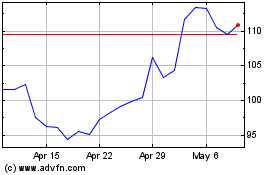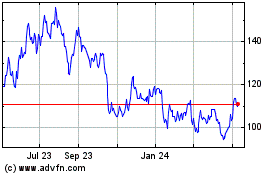By Liza Lin
SHANGHAI-- Baidu Inc. will share software technology it is
developing for self-driving cars in a bid to catch up with
competitors including General Motors Co. and Waymo, the
self-driving unit of Google parent Alphabet Inc.
Open sourcing Baidu's capabilities in functions such as route
planning, vehicle control and operating systems will help Baidu and
the autonomous-vehicle industry develop more rapidly, Baidu group
President Qi Lu said in an interview.
Mr. Lu said Beijing-based Baidu, best known for its Chinese
search engine, is in talks to use its technology with several
Chinese, U.S. and German auto makers but declined to identify
them.
Baidu and other executives are in Shanghai this week for Auto
Shanghai, China's biggest annual car show, where they will discuss
Baidu's push into autonomous vehicles.
Mr. Lu, a former senior executive at Microsoft Corp., was hired
in January as the No. 2 to Chief Executive Officer Robin Li. In
that role, he will also oversee Baidu's push into artificial
intelligence, which includes self-driving cars.
In his first one-on-one interview since taking the job, the
55-year-old Mr. Lu acknowledged the company had recently lost some
of its top talent, including chief scientist Andrew Ng, who
announced his resignation in March.
"We certainly wish some of the people you mentioned, especially
Andrew, had not left," Mr. Lu said. "They had made tremendous
contributions to Baidu," Mr. Lu said.
"At the same time, people do move. In our industry, it's
somewhat the norm," he added. "If you look at Google, Facebook,
Amazon, there's always talent flow."
Baidu is betting that the value from autonomous vehicles is
centered on collecting and processing data from riders, said
Michael Dunne, president of Hong Kong-based Dunne Automotive, an
advisory that facilitates auto-tech investments between the U.S.
and China.
"In five to 10 years, autonomous-driving functions will be
standard in the industry, just like power steering. Then, the value
will come from the data in the car: what people do, where do they
go," Mr. Dunne said.
This open-platform concept was tested by Tesla Inc. founder Elon
Musk almost three years ago, when Mr. Musk decided to offer open
access to Tesla patents out of frustration that electric-vehicle
sales remained a fraction of total car sales.
A San Francisco startup called Comma.ai began offering its
self-driving software online free last year after facing safety
questions from U.S. regulators about the company's aftermarket kit
designed to give certain Honda Motor Co. vehicles semiautonomous
features similar to Tesla's Autopilot system. The startup's
founder, George Hotz, said his product was aimed at self-driving
enthusiasts and researchers.
Still, Baidu competes with a growing list of U.S. technology and
automotive companies investing billions to disrupt the auto
industry. Google, Apple Inc. and auto makers GM and Ford Motor Co.
are among those investing heavily.
"We have huge respect for these companies, but we are taking a
different route," Mr. Lu said. "We believe in an open approach, a
partnership-centric way, and we believe our knowledge of the China
market will be our advantage."
Baidu has AI strengths, but it has lagged behind in
commercializing them, said Bhavtosh Vajpayee, an analyst with
Bernstein Research. He cited the success Amazon has had with its
voice-enabled assistant Alexa as an example of how Baidu could
monetize its voice-recognition technology.
"Fresh thinking at the top and some of the management churn
could turn out to be a blessing in disguise perhaps?" said Mr.
Vajpayee, who is based in Hong Kong.
Last year, Baidu saw its online-advertising business hit hard by
stricter Chinese regulations, and its market value has trailed
rivals Alibaba Group Holding Ltd. and Tencent Holdings Ltd.
Baidu has dubbed its open-source driving project Apollo, after
the U.S. space program that put astronauts on the moon. Mr. Lu said
it is on track to deliver autonomous commercial vehicles in 2018
and will mass produce self-driving vehicles by the end of 2020. The
company demonstrated its self-driving car at China's internet
conference in Wuzhen last year and has been conducting road tests
in China and California.
Baidu said its system is designed to work with off-the-shelf
hardware such as components or vehicle-platform bases. That stands
in contrast to Waymo, which has developed its own hardware such as
sensors that it says are integrated into the system.
Using Baidu's software will also give car makers access to
critical high-quality mapping technology in China, a space that
foreign technology companies have made little inroads in.
Tim Higgins in San Francisco contributed to this article.
Write to Liza Lin at Liza.Lin@wsj.com
(END) Dow Jones Newswires
April 18, 2017 23:02 ET (03:02 GMT)
Copyright (c) 2017 Dow Jones & Company, Inc.
Baidu (NASDAQ:BIDU)
Historical Stock Chart
From Mar 2024 to Apr 2024

Baidu (NASDAQ:BIDU)
Historical Stock Chart
From Apr 2023 to Apr 2024
